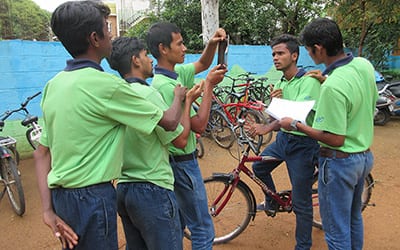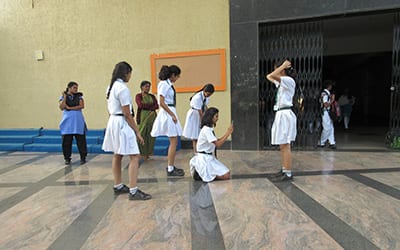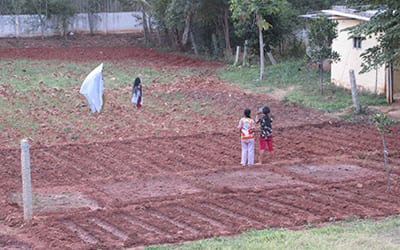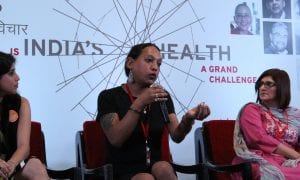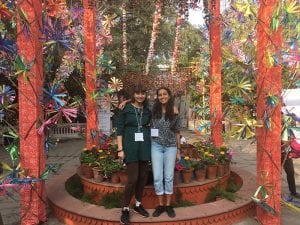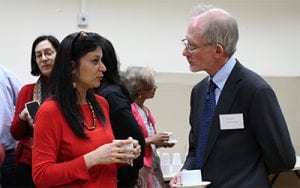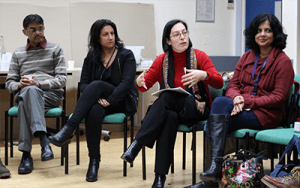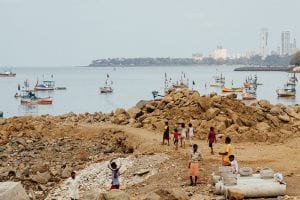Sujitha is a UCL global health graduate and final year medical student
 Over 250 people from across the world participated in Difficult Dialogues last week, exploring issues like access to healthcare, the recent India budget speech, and the intrinsic link between sociocultural beliefs and health.
Over 250 people from across the world participated in Difficult Dialogues last week, exploring issues like access to healthcare, the recent India budget speech, and the intrinsic link between sociocultural beliefs and health.
To say that this is a comprehensive summary of the conference would be a disservice to the complexity of the discussions that took place in Goa. This blog will explore three points of discussion that I believe hold significance for health not only in India, but around the world.
- Whose responsibility is health?
“Be proactive and responsible for your own health. What you can do for your own health, no one else can do.” – Manisha Koirala, Bollywood actress and breast cancer survivor
Manisha Koirala’s message of taking responsibility for your health being key to disease prevention is a familiar one, for most of us know who you avoid if you eat an apple a day. My question is what if not everyone has the same access this apple? What if it is an uneven playing field? Some have orchards in their back gardens, others have to travel for days across cities to even lay eyes on an apple and some don’t even know what an apple is, let alone its significance in keeping the doctor away.
The question I’m asking is what about the role of the state, in providing education, transport, access and facilities etc, in providing the context in which individuals can then take responsibility for their health. There needs to be a balance between the onus being on the individual and the responsibility of the state in providing an environment conducive to individuals making healthy choices.
 As Dr Aarathi Prasad, of UCL’s Office of the Vice-Provost (Research), said: “Where people live and how they live, greatly impacts their health.” Being a UCL student, I was introduced to the social determinants of health very early on in my career in a lecture by the pioneer Professor Sir Michael Marmot. It continues to have a lasting influence on how I question and understand health. Why don’t we look at the causes of the causes? Why is it that some people smoke more than others? How can there be a 20-year difference in life expectancy between two neighbouring towns? Looking at it from this perspective, it is not easy in the sense that there are no quick solutions. It requires multi-sectoral input. Unfortunately there is no single vaccine, no magic bullet that will provide universal health coverage. The complexity of this was touched upon by Professor Venkatapuram of King’s College London, in the opening panel discussion with the poignant question: “ How do we make for example, the minister of transport, care about health?”
As Dr Aarathi Prasad, of UCL’s Office of the Vice-Provost (Research), said: “Where people live and how they live, greatly impacts their health.” Being a UCL student, I was introduced to the social determinants of health very early on in my career in a lecture by the pioneer Professor Sir Michael Marmot. It continues to have a lasting influence on how I question and understand health. Why don’t we look at the causes of the causes? Why is it that some people smoke more than others? How can there be a 20-year difference in life expectancy between two neighbouring towns? Looking at it from this perspective, it is not easy in the sense that there are no quick solutions. It requires multi-sectoral input. Unfortunately there is no single vaccine, no magic bullet that will provide universal health coverage. The complexity of this was touched upon by Professor Venkatapuram of King’s College London, in the opening panel discussion with the poignant question: “ How do we make for example, the minister of transport, care about health?”
- How do we make health a priority for policy makers?
There was a lot of discussion about the recent India budget speech, with many calls for the Indian government to increase its public spending on health and the key role of civil society and citizens in making health a priority for policy makers. This was something that came up numerous times over the three days. The role of the media in bridging this gap between policy makers and the rest of society is central to this discussion. Abantika Ghosh, journalist and writer for the Indian Express put forward her views on the relationship between health and journalism in India: “There is a huge readership for stories about scientific breakthroughs. Something that may not make it to the hospitals in the next ten years generates a lot of excitement because it is something exotic. It is like reading science fiction. On the other hand public health, which is so much more important, so much emergent a need, gets much more neglected in the media space.”
This difficulty expressed by Ghosh is unlikely to be experienced by India alone, but also shared across the world. As Dame Anne Johnson (UCL’s Vice-Dean International for Population Health Sciences) said: “The problems India facing are global problems – we all have them.”
The media has the potential to play a huge role in raising awareness of health issues among the public and also in holding the government accountable. The work of Sohini Chattopadhyay, an independent journalist, is a clear example of this. Chattopadhyay carried out an undercover investigation unearthing shocking findings about the quality of care and experiences of women during childbirth in a particular labour room in Calcutta. Whilst not quite meeting the Millennium Development Goal for reduction in Maternal Mortality, India has seen a significant decrease. As Chattopadhyay stated: “That kind of improvement is incredible, but ten years down the line, we have to talk about a little more than ‘Is the woman alive after childbirth?’ We have to start talking about qualitative experiences.”
- Is grassroots organisation a substitute for policy?
This was in fact a question asked by David Osrin, UCL Professor of Global Health, during the arts and health workshop. The primary aim of the summit was to collate at least one policy recommendation from each panel discussion and before presenting them to the Prime Minister, Narendra Modi. For me, the numerous examples of existing projects making a tangible impact on communities was at the forefront of what makes Difficult Dialogues a force for change.
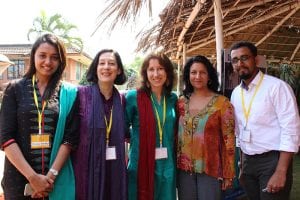 Delan Devakumar’s work crafting short films on topics like child marriage and organising screenings to raise awareness and catalyse discussion is just one of many examples. Professor Osrin’s work in the Dharavi Slums with the Alley Galli Biennale is a beautiful demonstration of how art can intersect with community and health. The two-year process led to an exhibition, blending art and science to share information on urban health and showcase the contribution of the Dharavi people to Mumbai’s economic and cultural life. With four themes – art, health, recycling and vitality – the Biennale invited Dharavi residents to meet, educate themselves on urban health, learn new skills, and produce locally resonant artworks that were authentic, honest and relevant.
Delan Devakumar’s work crafting short films on topics like child marriage and organising screenings to raise awareness and catalyse discussion is just one of many examples. Professor Osrin’s work in the Dharavi Slums with the Alley Galli Biennale is a beautiful demonstration of how art can intersect with community and health. The two-year process led to an exhibition, blending art and science to share information on urban health and showcase the contribution of the Dharavi people to Mumbai’s economic and cultural life. With four themes – art, health, recycling and vitality – the Biennale invited Dharavi residents to meet, educate themselves on urban health, learn new skills, and produce locally resonant artworks that were authentic, honest and relevant.
Recently UCL partnered with Symbiosis International University to evaluate existing health, education and sanitation interventions within the Pune district. Devaki Gokhale, Assistant Professor at Symbiosis University said: “This partnership with UCL is an exhilarating experience, the sharing of ideas, thought provoking discussions, listening to the needs and concerns expressed by villagers from a different lens and, through a holistic approach, feels prolific.”
Community interventions and policy are not mutually exclusive, and nor should they be. However, there are distinct gaps where policy is far from having a real impact on people’s lives. This is the ideal space for projects like these to flourish and make a difference.
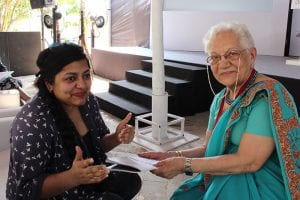 At the heart of all these grassroots projects are partnerships. Whether between institutions, or even on an individual basis. It is clear that we have a lot to learn from each other. Sneh Bhargava, India’s first female radiologist and recent director of the All India Medical Institute of Medical Sciences (AIMS), was a figure Ina Goel (UCL PhD student) learnt about and looked up to in school. When they met, Ina was in awe of her work as a trailblazer in the field of medicine and Sneh was fascinated by Ina’s essay on universal health care.
At the heart of all these grassroots projects are partnerships. Whether between institutions, or even on an individual basis. It is clear that we have a lot to learn from each other. Sneh Bhargava, India’s first female radiologist and recent director of the All India Medical Institute of Medical Sciences (AIMS), was a figure Ina Goel (UCL PhD student) learnt about and looked up to in school. When they met, Ina was in awe of her work as a trailblazer in the field of medicine and Sneh was fascinated by Ina’s essay on universal health care.
When health is something so clearly impacted by politics, economics, and sociocultural factors, maybe the bringing together of different perspectives and background to achieve common goals, should be an approach taken not only in the community and among universities, but also at state level. Perhaps the key is to figure out how to make the transport minister care about health after all?
 Close
Close



